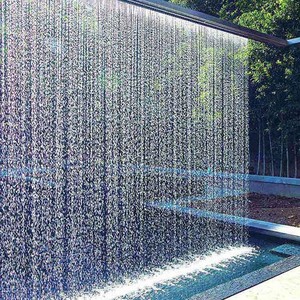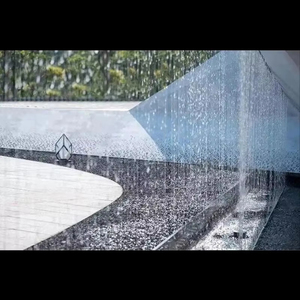(27500 products available)
























































































































































































































There are numerous types of decorative outdoor water fountains. Home and business owners can choose water fountains that best suit their style preferences and their spaces' architectural design. The following are some of the most common types of outdoor water fountains:
Wall fountains
As the name suggests, these fountains are mounted on walls. They are an excellent choice for homeowners with limited outdoor space. They have a cascading effect and circulate water through a series of pools and basins. Wall fountains are available in various designs and can be made from different materials. Some common materials include metal, stone, and concrete. They have a tranquil vibe and are ideal for creating a relaxing atmosphere.
Solar-powered fountains
These fountains use solar energy to power the fountain pump. They are a popular choice among eco-conscious homeowners because they are energy-efficient and environmentally friendly. Most solar-powered fountains have a solar panel that needs to be placed in an area that receives direct sunlight to function effectively. They are available in different styles and sizes and are great for reducing one's carbon footprint.
Birdbath fountains
These fountains feature a flat basin that serves as a birdbath. It attracts birds and provides them with a place to drink and bathe. Birdbath fountains are visually appealing and can enhance the beauty of any outdoor space. They are available in different styles, from simple and modern to ornate and traditional. Most come with a recirculating pump that helps to keep the water clean and fresh.
Tabletop fountains
Tabletop fountains are small and compact, making them suitable for placement on tables, desks, or small patios. They create a tranquil ambiance in indoor or outdoor spaces. Most tabletop fountains are self-contained, meaning they have a water reservoir that doesn't need refilling frequently. They are available in different materials, such as ceramic, stone, and resin.
Tiered fountains
These fountains feature multiple levels or tiers from which water cascades downward. They are visually striking and are commonly used as centerpieces in gardens or patios.
Decorative outdoor water fountains have different functions and features worth noting. Here are some of them:
Centerpiece
Outdoor water fountains often serve as the main focus point in gardens, yards and public spaces. Due to their features, they draw attention and create a pleasing atmosphere. This makes them a popular choice for homeowners and businesses.
Aesthetic Appeal
These fountains are very important to any space where they are installed. They come in different designs and styles that enhance the beauty of the surroundings. From modern sleek designs to traditional ornate styles, there is a fountain for every taste and preference.
Sound of Water
One important feature of outdoor water fountains is the sound of water. The gentle sound of flowing water is soothing and creates a relaxing environment. This sound can help mask unwanted noise from traffic or other urban sounds, creating a tranquil oasis in a busy city.
Wildlife Attraction
Decorative outdoor water fountains also attract wildlife. Birds, butterflies, and other small animals are attracted to the water source. This makes a garden or yard more lively and creates a mini-ecosystem. Additionally, having wildlife visit a fountain can be entertaining and add to the overall enjoyment of the space.
Stress Relief
Stress relief is an important feature of outdoor fountains. The relaxing atmosphere created by the gentle sound of water can help reduce stress levels. Being in a space with a decorative outdoor water fountain can improve mental well-being and create a sense of calm.
Air Humidity
Another feature is air humidity. The water that evaporates from the fountain can help increase humidity levels in the surrounding area. This is important in dry climates where extra moisture is needed to keep plants healthy.
Recycling Water
All outdoor fountains operate with a recirculating pump. This pump enables them to recycle water. The ability to recycle water makes them eco-friendly. It also means that once a fountain is filled with water, it continually operates without the need for extra water.
Relaxation and Meditation
Some fountains create an atmosphere that is conducive to meditation and relaxation. Their calming presence can help focus the mind and promote a sense of inner peace.
Decorative outdoor water fountains offer a variety of applications for different industries and settings. Here are some key industry applications:
Home and Garden Retailers:
Home and garden retailers sell outdoor water fountains for decorative purposes. They provide a range of options catering to different customers' preferences and price points. In addition, they offer installation accessories and other products such as; garden lights, and solar panels that enable customers to set up their fountains at home.
Landscapers and Outdoor Designers
Landscapers and outdoor designers use decorative outdoor water fountains to enhance their clients' outdoor spaces. They select and install fountains that blend with the clients' existing systems and meet their aesthetic requirements. In addition to the visual appeal, these fountains offer outdoor spaces a relaxing ambiance that clients appreciate.
Hospitality Industry:
Restaurants, hotels, and resorts use decorative outdoor water fountains in their spaces to provide a warm and inviting environment for their guests. They incorporate these fountains in courtyards and patios, where they serve as focal points. In addition, the soothing sound of running water enhances the guests' overall dining and lodging experience.
Event Planners:
Outdoor water fountains are used as decorative elements in outdoor events and spaces such as; weddings and corporate events. Event planners rent these fountains to clients to enhance their outdoor spaces with their visual appeal and soothing sounds. In addition, some large-scale decorative fountains can serve as the main focus of an event.
Public Spaces and Institutions:
Public parks, institutions, and museums use large-scale decorative outdoor water fountains as key features. These fountains act as gathering places for tourists and locals. Also, they enhance the beauty of the site and give it a cultural significance that makes it more attractive to tourists.
Wellness and Spa Centers:
Wellness and spa centers use decorative outdoor water fountains to create a calm and peaceful atmosphere where clients enjoy their treatments. Some centers have outdoor spaces where clients relax and enjoy ambient sounds, sights, and spa treatments.
Before buying decorative outdoor water fountains for sale, it is important to consider certain key factors to ensure a successful purchase. Here are some of the factors to take into account:
Scale and Size
Buyers should consider the dimensions of their space and the scale of the decorative outdoor water fountains in relation to it. Larger fountains may be appropriate for spacious outdoor areas, while smaller fountains may be more suitable for compact spaces. Also, it is important to consider the height and prominence of the fountains so they can be placed in a position where they can be easily seen. This ensures they become a focal point in the outdoor area.
Materials
When choosing a fountain, it is important to consider the materials used to make it. Options like metal, stone, or resin are available, and each has its advantages. For instance, metal fountains are known for their durability, while stone fountains are more classical and elegant. On the other hand, resin fountains are lighter and more affordable.
Style
Buyers should choose decorative outdoor water fountains that have a style complementing the outdoor area's aesthetics. For instance, if the outdoor area has a modern design, buyers should opt for fountains with sleek and clean lines. However, if the outdoor area has a traditional style, tiered or ornate fountains would be more appropriate.
Power Source
Business owners should consider how the fountains will be powered. Some fountains require electrical connections, while others are solar-powered and do not need any form of energy. Solar-powered fountains can be more convenient in areas that receive a lot of sunshine, and they are also eco-friendly.
Maintenance
Buyers should also consider the maintenance needs of the fountains. They should opt for fountains that are easy to maintain with simple upkeep requirements. Fountains that have features like water recirculation systems can be simple to maintain as they minimize water usage and require less manual work.
Q1: How are decorative outdoor water fountains powered?
A1: Most outdoor fountains are powered by electrical submersible pumps. The pump circulates water, creating the desired decorative effect. Some fountains may use solar-powered pumps, which are eco-friendly and reduce electricity costs.
Q2: Do decorative outdoor water fountains require a lot of maintenance?
A2: Fountains do not require a lot of maintenance, but they require some. For starters, they need to be cleaned regularly to prevent algae and mineral buildup. The fountain also needs to be refilled from time to time due to water evaporation. In addition, the pump should be checked to ensure it is working properly.
Q3: Can someone install decorative outdoor water fountains by themselves?
A3: Yes, it is possible to install a fountain without the help of a professional. Self-installation is possible if the fountain is not complex and is small in size. Most manufacturers provide a fountain installation guide that details all the steps to take when installing the fountain.
Q4: Do decorative outdoor water fountains use a lot of water?
A4: Decorative outdoor water fountains do not use a lot of water. Once the fountain is set up, it forms a closed loop. In this closed loop, water is circulated continuously, meaning water is not wasted.
Q5: Can someone use their decorative outdoor water fountains for swimming?
A5: One should not use their fountain for swimming pools. Fountains are not suitable for swimming because they circulate water but do not filter it. They also lack the necessary chemicals that make water safe for swimming.